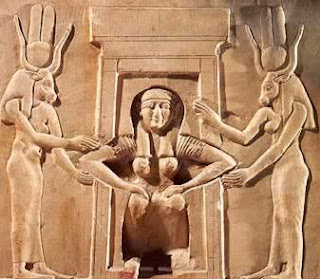 |
| Marriage in Ancient Egypt - Amenhotep III |
A whole catalogue of pithy comments on the shortcoming of the fair sex us to be found in the Instructions of Onkhsheshongy, although it is to be hoped that they are tongue-in-cheek: ' Instruction a women is like having a sack of sand whose side is split open !
Let your wife see your wreath, do not trust her with it!; 'do not open your heart to your wife, what you have said to her goes into the street!'.The chief object of marriage was to have children, especially a son, not only to continue the Ancient Egyptian Family line but also to provide a proper burial for his parents and to ensure that the correct rituals were carried out for their spirits. If a couple were childless they appealed spirits. If a couple were childless they appealed to the gods, as in the Tale of the Doomed Price in which the king. Without an heir, ' begged a son for himself from the gods of his domain and they decreed on should be born to him'. The main deities concerned with fertility and child bearing were Hathor and Taweret, although in the Late Period Imhotep, the god of medicine, was also invoked.
The Birth in Ancient Egypt
Egyptian women gave birth crouching it kneeling in two to four bricks, placed apart to allow the child to be disengaged by at least two midwives. A description of a birth can be found n the Tales of Wonder contained in the West-car Papyrus. A woman named Ruddedit gives birth to three future rulers of Egypt, after which she undergoes 'a cleansing of fourteen days; this presumably consisted of a period of rest and care to avoid post-natal infections which would have been hard to cure. Some remedies to combat such problems are given in medical papyri m but the prescriptions are unlikely to have had much practical effect.
 |
| Giving birth in Ancient Egypt A squatting woman giving birth, assisted by two goddesses (Hathor and Taweret), from the Temple of Hathor at Dendera |
At birth the child as give a name by its mother. The choice if name was motivated by one of several factors. Some names reflected the immediate circumstances of the birth or perhaps the divine intervention which brought it about. Others indicate the power or popularity of a god at a particular time, or perhaps the local deity of a town or village. Names including that of the ruling Pharaoh or dynasty are also frequent, as are those which for a person into his or her Ancient Egyptian Family-tree, especially among royal, noble or priestly houses. Many Egyptian names were long and not suited to social usage and many people therefore acquired a nickname, given by Ancient Egyptian Family or friends but also used in legal document.
Web Search:
- Family Life in Ancient Egypt
- Ancient Egypt Family Life
- Ancient Egyptian Family Life
- Ancient Egyptian Family
- Ancient Egypt Family
- Daily life in Ancient Egypt









 Posted in:
Posted in: 

0 comments:
Post a Comment